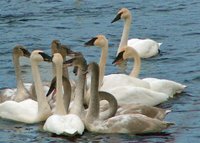Sister Edith, our fledgling blogger from Duluth at Monastic Musings, perhaps ran into a few fledgling Trumpeter Swans in Monticello last January. I recall how great it was the first tiime I drove down to Wabasha and saw all the Bald Eagles during the Spring mating season. I wonder what the luddites think about nuclear power and coal power when they realize with without them, the Trumpeter Swans and the Canada Geese would be extinct in occasionally frigid Minnesota. (Well some days, maybe it would be OK if we had fewer Canada Geese on our lawns).
Sister Edith was surprised to hear how noisy swans could be. Just like modern life, especially on a college campus.
 I never dreamed of seeing Trumpeter Swans in the wild. Feared to be extinct in 1900, their habitat was protected. Even today, there are fewer of these huge water birds in the US than there are Bald Eagles.
I never dreamed of seeing Trumpeter Swans in the wild. Feared to be extinct in 1900, their habitat was protected. Even today, there are fewer of these huge water birds in the US than there are Bald Eagles.When I heard, last January, that nearly 1000 swans winter over downstream from the nuclear power plant in Monticello, MN, I had to see them.
The experience was certainly incredible, but not at all what I expected. In place of a peaceful scene -- elegant swans quietly gliding on the Mississippi -- I saw utter chaos. These birds earn their names as "trumpeters" with a loud and distinctive call that could be heard blocks away. They flew in and out, picked arguments with each other, and sought new mates (one attraction of this location). They trampled down the snow along the riverbank near the home of the woman who feeds them, leaving it a dirty brown. The swans are beautiful, magnificent creatures. But the magic of their beauty is diminished when it is commonplace, crowded, and noisy.
[snip]
The loss of silence is, I think, an even deeper loss, one which we have been convinced to inflict on ourselves. Technology's latest advances (so-called) send the message that silence must be avoided. Gone are quiet moments for mulling over something read or said. They are filled with lyrics, news, podcasts, sports - anything to keep us distracted. Lost, also, is the chance to think better of something we did or said, the serendipity of two ideas colliding to create something new, or the long slow process of playing out an insight like a fishing line, seeing what else it catches.
Our monastic prayer consists of psalms chanted or spoken aloud with a minute of silent prayer after each one, following the ancient monastic tradition. Visitors often think the psalms are the prayer, and wonder why we wait so long in between. The early Desert monastics, though, referred to this practice as "The Psalmody and the Prayers" in recognition of the dialogue: God speaks to us through the Psalms; the prayers are our response in the silence of our hearts. [snip] Read More
No comments:
Post a Comment